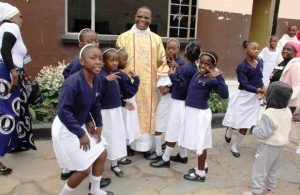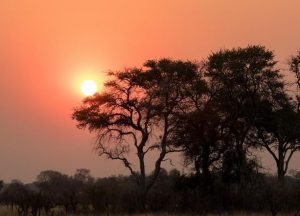Karamoja is the name of the Catholic Diocese of Kotido’s radio station. It is a project to give a voice to the people of the region.
Dust and the sun beating down, a single straight dirt road cuts the town of 25,000 inhabitants in half – this is Kodito. It is one of the most important centres in the region of Karamoja, in the north-east of Uganda, bordering Kenya and South Sudan.
Kotido is the capital of the homonymous district and is located nearly 500km from the Ugandan capital, Kampala. Only half of the road is paved, the rest is a dirt track. In the dry season it can be reached in about ten hours, but in the rainy season there is always a very high risk of getting stuck in the mud.
On a large poster at the entrance of the town we read “We cannot wait for Karamoja to develop”. “From the time of the British we have been an abandoned region. Even now the Kampala government does very little for our region. It’s up to us to really think about our own development now”, says Francis Njata, a social assistant in the area.
The Karamoja region extends for about 27,000 km. It is a boundless, arid savannah, bare and swept by an incessant wind, wet from sporadic rains, where the environment appears favourable to man in little or nothing. With the exception of the few centers, people live more or less in villages, scattered throughout the bush.
A region inhabited by a mosaic of tribes; Dodoz, Jie, Karimojong, Pokot, Tepeth, Teso, Labwor, Nyangia, Mening, Nyakway.
The economy revolves around cattle, which is not only an economic asset but has a specific cultural value. Every pastor knows and calls his cows by name, and their number is still proportional to the prestige which their owner has within his community.
One of the first things you notice upon entering in Kotido is the antenna of ‘Etoil in Karamoja‘, the voice of Karamoja, the radio of the diocese of Kotido. Thirteen people work permanently there, including the director, journalists, technicians and presenters. The schedule begins at 6.00am and ends at 23.00pm, a window of 17 hours, during which Karamoja can also look at the world.
From the early hours of the morning the radio announcer immediately presents national and international information. The reading of the newspapers takes place in English, the official language of Uganda along with Kiswahili, and in Karimojong, the local language, making it thereby possible for everyone to access the information. During the day, two hours are dedicated to talk shows dealing with issues of agricultural education, environment, territory and providing training on animal health. “It’s not necessary to have a radio for every family, one is enough for a village – we place ourselves in a circle and listen all together”, says Sylvester, 24, who is recording a piece on family hygiene.
Messages of this type, with a pedagogical and formative purpose, are sponsored by non-governmental organizations, as well as the government. But a private person may also, with a modest contribution, place an announcement. “Someone, for example, can report that he has lost an animal. Or want to know news of a relative. Or that in a particular village there will be a feast”. The radio thus becomes a means of communication between the villages of the savannah.
The headquarters of the radio is on the main street in Kotido, just opposite the antenna – five rooms sparsely furnished, wooden chairs and desks, a few benches for visitors, all flooded by the white liquid light that only an equatorial noon reserves. All except the two recording rooms. Here, we meet Joe Wacha, the station manager. He tells us that “the radio officially went on the air three years ago, after two years of preparation. We cover the whole region with our frequencies. We enter into the villages. We provide awareness and training. But also evangelisation being a Catholic radio. The issues we face are diverse. Our journalists go around the villages gathering ideas and proposals that are subsequently inserted into our programmes”. While we speak, a debate about local reality is on air.
‘Etoil in Karamoja‘ is also used to mobilise the villages during vaccination campaigns or to make communities responsible about human rights and the education of their children, through talk shows where nurses, teachers or representatives of the district take part. On Saturday morning, the radio enters a village. Between 9 and 11am a recorded debate is broadcast, which the conductors record in one of the neighboring villages. Problems related to alcoholism, early marriages, violence in the family, but also dealing with agricultural technology, animal diseases or managing conflict within the community are debated. Literacy programs are also offered.
We leave the radio station and they show us a room full of batteries. It is a generator, which allows the service to be maintained even when the power fails, a usual occurrence here. The voice of the radio is one that is becoming ever more present among the people and contributing to the development of the region.






